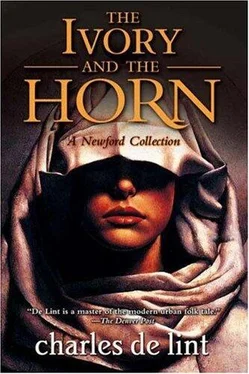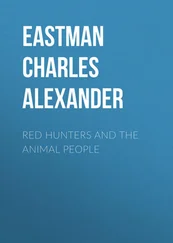Abandoned things make me feel sad. For as long as I can remember I've made up histories for them, cloaked them in stories, seen them as frog princes waiting for that magic kiss, princesses being tested with a pea, little engines that could if only they were given half a chance again.
But I'm pragmatic, too. Stories in my head are all well and fine, But they don't do much good for a dog that some guy's tossed out of a car when he's speeding through the Tombs and the poor little thing breaks a leg when it hits the pavement so it can't even fend for itself— just saying the feral dogs that run in these streets give it half a chance. When I can— if I get to it in time— I'm the kind of person who'll take it in.
People have tried to take me in, but it never quite works out right. Bad genes, I guess. Bad attitude. It's not the kind of thing I ever worried about much till the past few weeks.
I don't know how long I've been standing on the street, not even seeing the building anymore. I'm just here, a small shape in the moonlight, a stray dream from the safe part of the city that got lost and found itself wandering in this nightland that eats small dreams, feeds on hopes. A devouring landscape that fed on itself first and now preys on anything that wanders into its domain.
I never let it have me, but these days I wonder why I bothered. Living in the Tombs isn't much of a life, but what do you do when you don't fit in anywhere else?
I start to turn away, finally. The moon's up above the Clark Building now, hanging like a fat round flag on the smokestack, and the shadows it casts are longer. I don't want to go, but I can't stay. Everything that's important to me isn't part of the Tombs anymore.
The voice stops me. It's a woman's voice, calling softly from the shadows of my old squat.
"Hey, Maisie," she says.
I feel like I should know her, this woman sitting in the shadows, but the sense of familiarity I get from those two words keeps sliding away whenever I reach for it.
"Hey, yourself," I say.
She moves out into the moonlight, but she's still just a shape. There's no definition, nothing I can pin the sliding memories onto. I get an impression of layers of clothing that make a skinny frame seem bulky, a toque pulled down over hair that might be any color or length. She's dressed for winter though the night's warm and she's got a pair of shopping bags in each hand.
I've known a lot of street people like that. Hottest day of the summer and they still have to wear everything they own, all at once. Sometimes it's to protect themselves from space rays; sometimes it's just so that no one'll steal the little they've got to call their own.
"Been a long time," she says, and then I place her.
It's partly the way she moves, partly the voice, partly just the shape of her, though in this light she doesn't look any different from a hundred other bagladies.
The trouble is, she can't possibly wear the name I call up to fit her because the woman it used to belong to has been dead for four years. I know this, logically, intellectually, but I can't help trying it on for size all the same.
"Shirl?" I say. "Is that you?"
Shirley Jones, who everybody on the street knew as Granny Buttons because she carried hundreds of them around in the many pockets of her dresses and coats.
The woman on the street in front of me bobs her head, sticks her hands in the pockets of the raincoat she's wearing over all those layers of clothing, and I hear the familiar rattle of plastic against bone, a soft clickety-clickety-click that I never thought I'd hear again.
"Jesus, Shirley—"
"I know, child" she says. "What am I doing here when I'm supposed to be dead?"
I'm still not spooked. It's like I'm in a dream and none of this is real, or at least it's only as real as the dream wants it to be. I'm just happy to see her. Granny Buttons was the person who first taught me that "family" didn't have to be an ugly word.
She's close enough now that I can even see some of her features. She doesn't look any different than she did when she died. She's got the same twinkle in her brown eyes— part charm and part crazy. Her coffee-colored skin's as wrinkled as a piece of brown wrapping paper that you've had in your back pocket for a few days. I see it isn't a toque she's wearing, but that same almost conical velour cap she always wore, her hair hanging out from below in dozens of unwashed, uncombed dreadlocks festooned with tiny buttons of every shape and description. She still smells the same as well— a combination of rosehip sachet and licorice.
I want to hug her, but I'm afraid if I touch her she'll just drift apart like smoke.
"I've missed you," I say.
"I know, child."
"But how... how can you be here?"
"It's like a riddle," she says. "Remember our treasure hunts"
I nod my head. How can I forget? That's where I first learned about the freebies you can find in behind the bookstores, where I was initiated into what Shirley liked to call the rehab biz.
"If you cherish something enough," she told me, "it doesn't matter how old, or worn or useless it's become; your caring for it immediately raises its value in somebody else's eyes. It's just like rehab— a body's got to believe in their own worth before anybody can start fixing them, but most people need someone to believe in them before they can start believing in themselves.
"You know, I've seen people pay five hundred dollars for something I took out of their trash just the week before— only because they saw it sitting on the shelf of some fancy antique shop. They don't even remember that it once was theirs.
" 'Course the dealer only paid me fifty bucks for it, but who's complaining? Two hours before I came knocking on his back door, it was sitting at the end of the curb in a garbage can."
Garbage days we went on our treasure hunts. Shirley probably knew more about collection days than the city crews did themselves: when each borough had its pickup, what the best areas were depending on the time of year, when you had to make your rounds in certain areas to beat the flea market dealers on their own night runs. We had dozens of routes, from Foxville down into Crowsea, across the river to Ferryside and the Beaches, from Chinatown over to the East End.
We'd head out with our shopping carts, sensei baglady and her apprentice, on a kind of Grail quest. But what we found was never as important as the zen of our being out there in the first place. Each other's company. The conversation. The night's journey as we zigzagged from one block to another, checking out this alleyway, that bin, those Dumpsters.
We were like urban coyotes prowling the city's streets. At that time of night, nobody bothered us, not the cops, not muggers, not street toughs. We became invisible knights tilting against the remnants of other people's lives.
After Shirley died, it took me over a month to go out on my own and it was never quite the same again. Not bad, just not the same.
"I remember," I tell her.
"Well, it's something like that," she says, "only it's not entirely happenstance."
I shake my head, confused. "What are you trying to tell me, Shirley?"
"Nothing you don't already know."
Back of me, something knocks a bottle off a heap of trash— I don't know what it is. A cat, maybe. A dog. A rat. I can't help myself. I have to have a look. When I turn back to Shirley— you probably saw this coming— she's gone.
2
Pride goes before a fall, I read somewhere, and I guess whoever thought up that little homily had her finger on the pulse of how it all works.
There was a time when I wouldn't have had far to fall; by most people's standards, at seventeen, I was already on the bottom rung of the ladder, and all the rungs going up were broken as far as I'd ever be able to reach. I lived in a squat. I made my living picking garbage and selling the better stuff off to junk shops and the fancy antique places— only through the back door, if you would, yes it's a lovely piece but terribly worn, sorry that's my best offer, many thanks and do come again. I had a family that consisted of a bunch of old dogs so worn out that nobody wanted them, not to mention Tommy who's— what's the current euphemism? I lose track. Mentally handicapped, I guess you'd call him. I just call him Tommy and it doesn't matter how dim the bulb is burning in behind his eyes; like the dogs, he became family when I took him in and I love him.
Читать дальше












